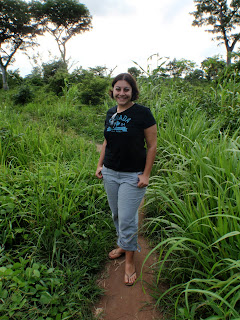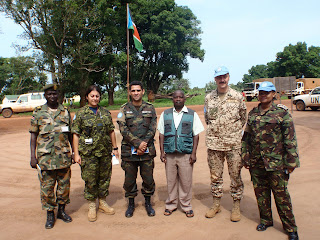In some ways life is easy here--simple and basic. My daily options are routine; variation is limited. I work, sleep, and eat. I take care of myself and socialize with my colleagues. I ensure that I drink enough water, use the washroom when the opportunity arises, scan my surroundings, and always have medical supplies and food/water with me. The basics are paramount: survival first, sanity next, and happiness after that. It is a unique experience to be able to remove the daily noise and hustle that is ever-present in our society and witness what remains. Many of the complications: greed, conflicting priorities, running around trying to check off a never ending to-do list and then dropping into bed at night, exhausted, are mostly absent from my day to day African life. Don’t get me wrong. There are many days when I am physically and emotionally drained; when patrols are difficult, situations are near hopeless, driving is tense, security is threatened, and dangers are present. But these are not superfluous things--they are part of survival here. Taking the time to step back and simplify life is one of the prime lessons that I will try to retain from this experience--at least for awhile, until our society drags me back into its reality.

5 July 2011 patrol to BIRISI, 20 km from YAMBIO and a one and a half hour drive. I was driver of vehicle 2 of a four vehicle convoy consisting of 2 UNMO and 2 Force Protection vehicles. While the road wasn't too bad it definitely wasn't good either. Navigating it required some interesting driving. Imagine 20 km in first and second gear for the whole way. My excitement at hitting third gear was short lived, about six seconds actually before I had to gear back down for a massive road block! It was a great final trip as a driver!
BIRISI is really just an SPLA camp with very few civilians there. We met with the Platoon Commander from BIRISI and the Company Commander from GANGURA and had a pleasant discussion.
Their excitement concerning their upcoming secession on 9 July was palpable. They have been fighting for so long and had lost so many in the pursuit of this goal; now their day was finally within reach!

5 July 2011 patrol to BIRISI, 20 km from YAMBIO and a one and a half hour drive. I was driver of vehicle 2 of a four vehicle convoy consisting of 2 UNMO and 2 Force Protection vehicles. While the road wasn't too bad it definitely wasn't good either. Navigating it required some interesting driving. Imagine 20 km in first and second gear for the whole way. My excitement at hitting third gear was short lived, about six seconds actually before I had to gear back down for a massive road block! It was a great final trip as a driver!

BIRISI is really just an SPLA camp with very few civilians there. We met with the Platoon Commander from BIRISI and the Company Commander from GANGURA and had a pleasant discussion.
Their excitement concerning their upcoming secession on 9 July was palpable. They have been fighting for so long and had lost so many in the pursuit of this goal; now their day was finally within reach!
As we were leaving, I noticed a strange mini tukul high in the air. Our language assistant explained to me that it was a tukul for chickens. I love it!
We stopped and visited with some children, handed out many suckers, and took a myriad of pictures. Don't tell the UN or any of the tough military guys, but that is one of my favourite activities during each patrol ;)
6 July 2011 patrol to BAGARE, 8.4 km from YAMBIO and a twenty minute drive. I was patrol leader of a 2 vehicle convoy. Our plans called for Force Protection (FP), but since BAGARE is basically within city limits and on a nice new road I determined it wasn't required, and I was right. Past BAGARE though, on the same road SODIA - SAKURE to the DRC, FP is definitely required. Being unsure of the future of the mission, the new mandate, and the status of UNMOs within that web, I felt like this was my last patrol. It was a beautiful day and when we arrived there were about 70 kids running around and playing.
The centre of BAGARE is a school area, with two classrooms that have tukul roofs and another five that are under mango trees. We met with some local teachers and all the kids! It was wonderful to watch them run and play and experience their different personalities!


A grade 7 student read to us, in English, from his HIV/AIDS book.
The teacher asked if I would take a picture of all of the students in each grade, so I did. We then took one huge group shot with all of us as well.

As we left we shook all their little hands and visited a bit. There were many smiles and much laughing all around. On our way back to our team site, we stopped to hand out candies (the remaining ones that many of you have sent from Canada) to each child and small group of people that we encountered. This made them immensely happy!
I received an exciting package that contained an interesting item--a Tim Hortons' gift card. As you all know me, you can’t possibly doubt the intensity of my passion for Tim Hortons' coffee or the fact that I am seriously missing it right now! So, this appeared to be a seemingly touching gesture. But, let’s break it down a bit--I am in the middle of a jungle in South Sudan. There are no Tim Hortons here! A wide range of emotions followed: excitement at seeing the card, intense craving for a Tim Hortons' coffee, and waves of homesickness at not being able to have one. The slight lack of situational awareness on the part of the sender also made me laugh, as I figured confusion between a Kandahar gift package and a Sudan one to be the rationale behind the gift.
I have become increasingly daring (read: lazy) at night as I often walk across the lawn in my flip-flops rather than follow the path around the compound with complete disregard for the snakes and little animals that may be hiding out in the grass.

Of course, when it rains I stick to the path, since the whole grass area instantaneously floods.
It is interesting, and noteworthy, to explore the normalcy of adaptation. Now that I am preparing myself to leave Africa and reintegrate into our society, I have begun to notice things to which I had grown accustomed. For instance, it is common practise to eat meat, or any food for that matter, with your hands because we often do not have proper utensils. Food and drink become communal with many people sharing and eating off of each others plates. Tables do not routinely have salt and pepper shakers but rather come equipped with a container of toothpicks that are used liberally after each meal. Meat is only tender if it is marinated for days; it is often a cruel and unusual test to attempt to find any meat mixed in with the bones and fat of a dish.
The accepted lower sanitary standards at restaurants, in bathrooms, and among general living conditions is noticeable when you step back. Toilet stalls turn into saunas in this extreme heat; leaving the door open becomes the only viable alternative that enables one to leave the bathroom without being completely covered in a blanket of sweat. Scavenging dirty soap is another strange phenomenon here. Amazingly, no matter how dirty the soap you still paradoxically feel it is better to use it to wash your hands than not when, in reality, it could be drastically dirtier than your hands already are!
I am now in JUBA and will be starting my out clearances tomorrow. I have a few more updates that I am hoping to write before I leave, in'shallah!
































